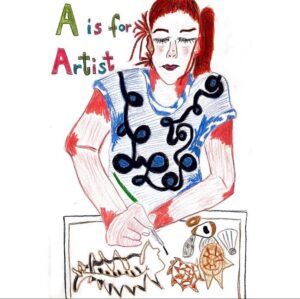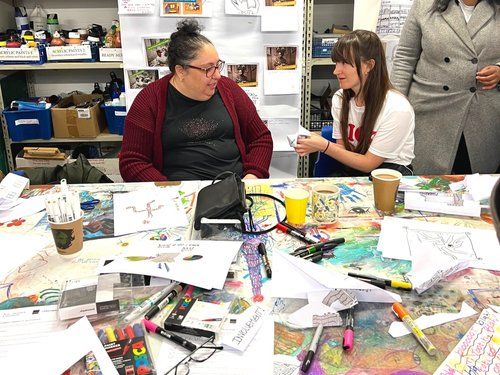When Portugal Prints first opened on Portugal Street in Soho in 1979, its founder occupational therapist, Gaynor Reynolds, envisioned a space where people living with complex mental health could engage in creative commercial work, such as print making. As more art therapists joined the team, Portugal Prints came to focus more on art sessions and therapeutic art making. Having undergone changes in location, management, and cuts in mental health funding, what remains at the core of Portugal Prints is the understanding that nurturing creativity, meaningful relationships and creating routine is fundamental for people’s wellbeing.
…nurturing creativity, meaningful relationships and creating routine is fundamental for people’s wellbeing
Portugal Prints closed on the 25th of April 2025 after 46 years as an extraordinary therapeutic arts community. Many of our artists have been a part of our community for decades. This loss cannot be overstated. It is not only a personal loss to each one of our artists and staff, but to our sense of possibility, for the future of projects like this and the future of long-term mental health support in the UK. The political climate and loss of funding for mental health services makes the timing of the closure particularly concerning. It is impossible to put into words the deep impact that Portugal Prints has had, but there are many reasons to try and record what we can of the culture, and how it was built.

We ran eight group arts sessions a week from our studio in West London. As with everything at Portugal Prints, we ran our sessions based on the emotional, practical and artistic needs of each one of the artists that we worked with. Central to this were the relationships between the artists themselves, as well as between artists and staff. Many of our artists have been marginalised in society and have a shared lived experience of the mental health care system. The focus on making art at Portugal Prints allowed artists to come together and support one another in a setting that placed them at the centre and focussed on their strengths. Our studio practice was founded in understanding and a culture of belonging. It is not only shared experience that creates an environment where people feel safe to be seen and heard, but each artist’s different experiences too. Our artists came from a wide range of cultures, religions, class, gender and sexualities. It is the making of artwork, the gathering around this focus, that enabled our artists to express something of who they are, and what they believe in, together.

Over the years Portugal Prints remained a secure base that our artists could return to whenever they felt that they needed more support or inspiration. Cultivating this base has given our artists confidence in building relationships and facing challenges outside of the studio. The studio environment also provided an opportunity for artists who have previously had difficulty tolerating group situations to overcome this. Likewise, the meaningful roles, responsibilities and routines that the artists engaged in in the studio were taken into their lives outside of the studio, empowering them to take control, exercise choice and agency. These responsibilities built up over time and were based on a deep and long-term understanding of who our artists are, what they have experienced in their lives, and, most importantly, what they wanted for themselves.
Over the years Portugal Prints remained a secure base that our artists could return to whenever they felt that they needed more support or inspiration.
Our artists made work in different ways. Some arrived at the studio with a clear idea of how they want to use the space. For others, the studio was a social space, and the art making facilitates a connection to others. Here, like in any shared art space, artists influenced and inspired each other. The process of making art is both an expansive one, enabling people to socialise and express themselves, and, at times, a process of containment. When artists came into the studio in states of distress, or struggling with intrusive voices or thoughts, the making of art that enabled them to remain in the group, and benefit from its therapeutic properties.
As well as our artistic practice, Portugal Prints became a group of people who advocated for one another. As staff, if our artists are going through a crisis with their housing, for example, we sat beside them and helped them to sort it out. We worked towards reducing the inequality that exists in navigating a system that is becoming increasingly difficult to navigate. Our trips to galleries and museums increased accessibility to cultural spaces that could feel closed off to our artists. It is the consistent time that we spent with our artists that gave us a holistic understanding of their needs and allowed us to be there to assist them in a considered way, in their individual contexts.
Ours is a powerful community that has been built up over many years. In each group, you could feel the legacy of the years and the artists that have come before. It is with a heavy heart that we say goodbye to every one of the artists that we have been so inspired by and come to know. We hope that Portugal Prints will encourage others to invest in long-term projects like ours and know that everything that it has given us will live on.
The Baring Foundation will be publishing a new report called Creatively Minded in the Studio in July 2025, showcasing UK arts organisations offering visual arts opportunities to people with mental health problems. Watch this space!